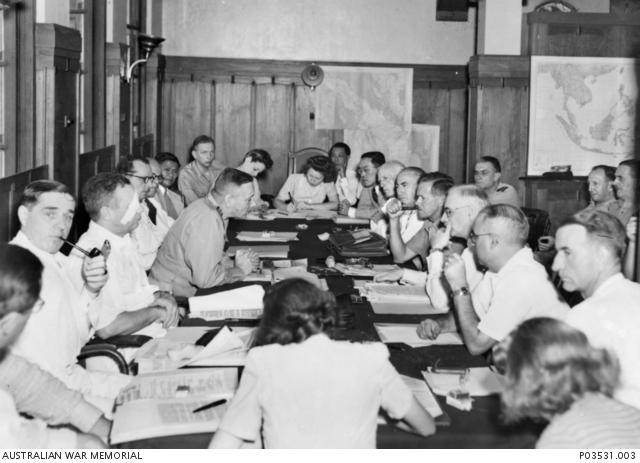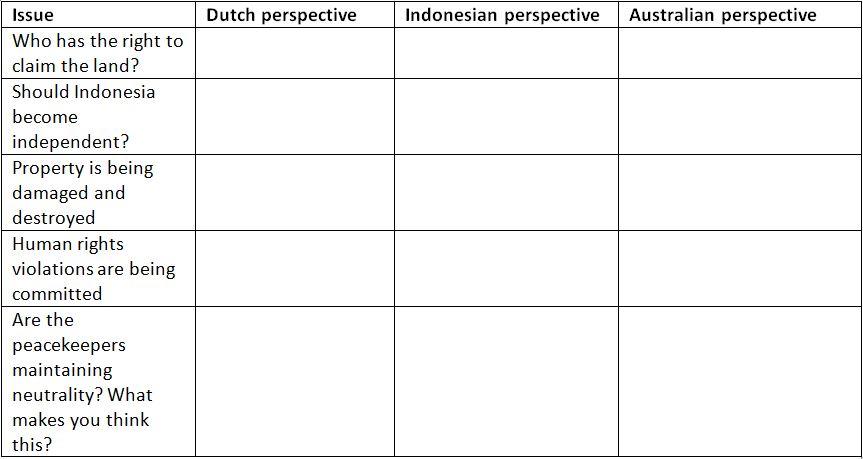Exploring multiple perspectives

The UN Consular Commission meets with Dutch officials in Indonesia, 1947. (Netherlands Indies Government Information Service, AWM P03531.003)
- Examine the following sources and complete the table below:
|
“There is a considerable amount of evidence to indicate that the Dutch activities have not always been conducted according to the rules of war with due regard for ordinary humanitarian considerations. The evidence shows that atrocities have been committed and rape, robbery and arson are not uncommon. Nothing has been heard of Dutch allegations against the Indonesians but presumably similar charges will be made.”
Report submitted by military observing officers in the Jogjakarta area, Indonesia, c. July 1947. (NAA: A4355 7/1/7/6, part 2, question 6) |
|
“The scorched-earth policy adopted by the Indonesians has been applied extensively and has resulted in very great damage to property, normal services and communications.”
Report on visit to East Java by Mr C. Eaton, Australian Consul-General, and Mr E.T. Lambert, Deputy British Consul-General, Batavia (Jakarta), September 14, 1947. (NAA A4355 7/1/7/6, p. 9) |
|
“There is abundant evidence of the fact that both sides have committed, and are continuing to commit, daily breaches of the ‘cease hostilities order’. It has been impossible for the observers to determine which party initiated breaches of the ‘cease hostilities order’.”
Report from the Australian military observing offices on the military situation in Java, Indonesia, August–September 1947. (NAA A4355 7/1/7/6, p. 3) |
|
“The Dutch viewpoint is unknown, but the T.N.I [Tentara Nasional Indonesia: Indonesian National Military] policy is to destroy important public buildings, factories and road and rail bridges before withdrawing from areas occupied by them.”
Report submitted by military observing officers in the Jogjakarta area, Indonesia, post July 1947. Part 2 question 7 (NAA: A4355 7/1/7/6) |
|
“There has been a good deal of propaganda from both sides, some of it inflammatory, especially from certain Indonesian leaders … much could be done to reduce bitterness by a modification in tone.”
Joint report of the Security Council Consular Commission, Batavia (Jakarta), October 14, 1947. (NAA A4355 7/1/7/3, p. 10, section 45) |
|
“The Australian position was simply that the Dutch, who had invaded Republican territory, were clearly the aggressors, and that they were able to go on consolidating their position at a time when the UN in New York erroneously believed that both parties were adhering to the ceasefire.”
(Dr Peter Londey, Wartime 1, November 1997, p. 56) |
|
“Some of the Australian officers who have been assigned to the consular commission as military observers paid a visit to Batavia’s Hotel Des Indes on their return from a trip to Jokjakarta. They paid the ‘djongos’ in republican currency. When the djongos refused this currency, one of the Australian officers took him by the scruff of the neck saying: ‘Do you refuse to take your own money? Do you know this currency is known in America, Australia and Britain, while the value of the Netherlands Indies guilder is decreasing?’”
Cablegram to Department of External Affairs based on a report in Aneta papers, 4 October 1947. (NAA A4355 7/1/7/3, cablegram 343) |

A question of resolution
- How was the conflict between the Netherlands and Indonesia resolved?
Further information can be found here: http://www.newworldencyclopedia.org/entry/Indonesian_War_of_Independence
Brainstorm other ways in which conflict between nations can be resolved.
Some examples of conflicts and their outcomes can be found here:
Korea: https://www.history.com/news/north-south-korea-divided-reasons-facts
Cyprus: https://www.bbc.com/news/world-europe-17217956
Vietnam: http://www.historynet.com/vietnam-war
Sierra Leone: https://www.britannica.com/place/Sierra-Leone/Civil-war
Extension activity: choose one of the above conflicts, and answer the following questions:
- Has the conflict been resolved; if so, how?
- Do you think the resolution was fair?
- Who did the resolution benefit?
- Were peacekeepers involved in the resolution? If so, how? If not, how might they have been able to assist?